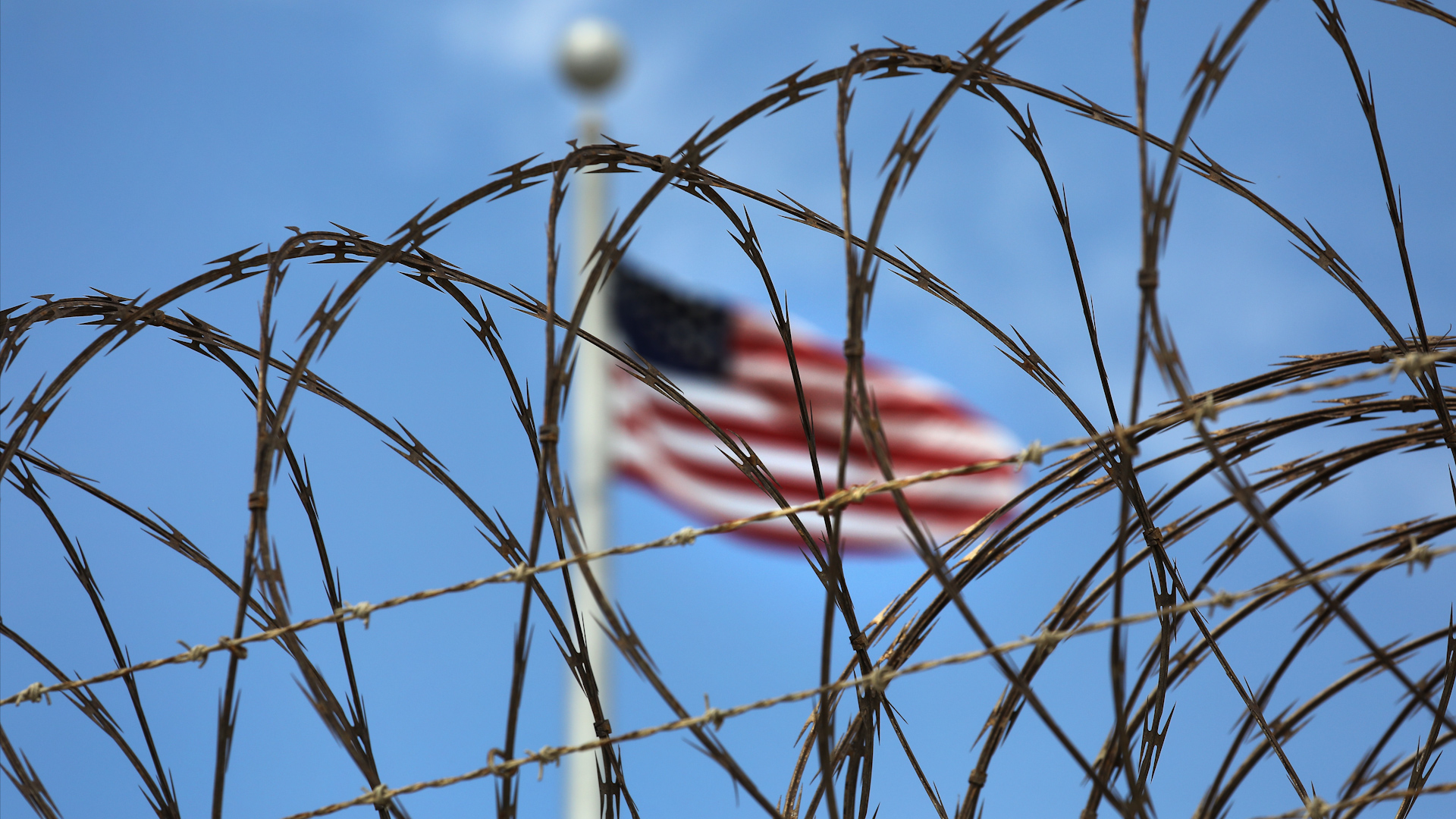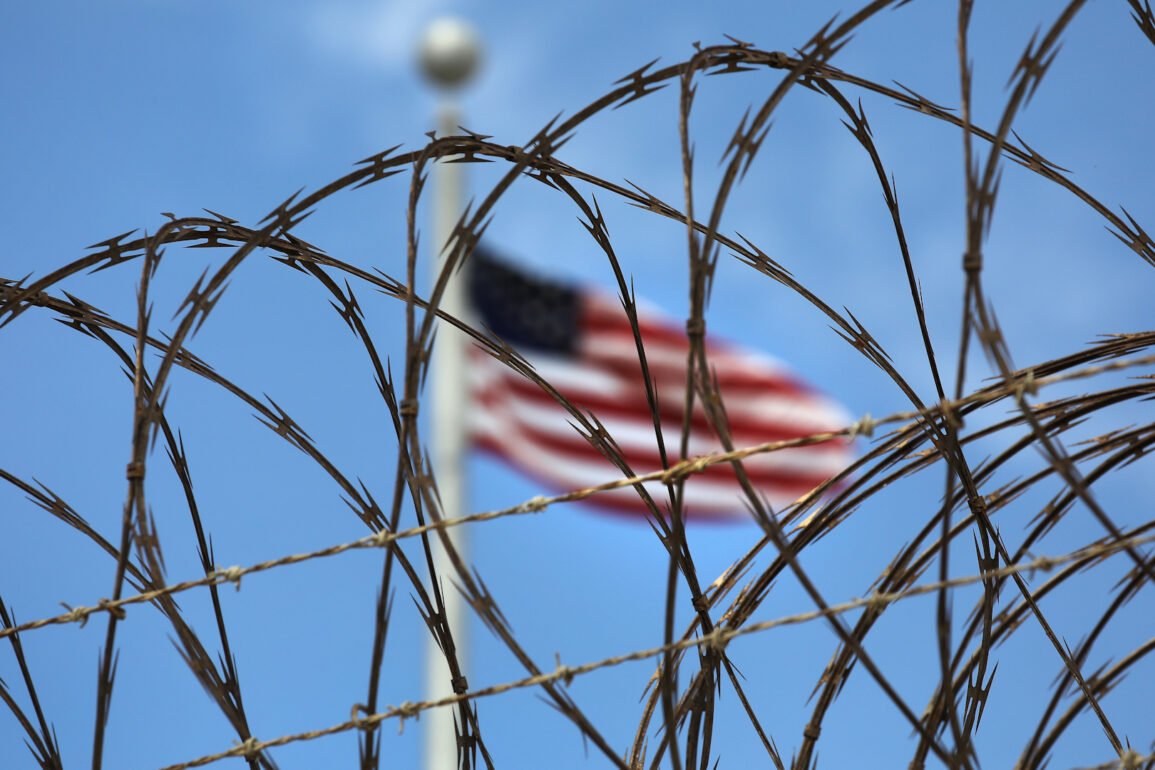
The Trump administration is moving to reopen and repurpose shuttered detention facilities across the country, reviving sites previously closed because of safety violations, staffing shortages and legal challenges as it expands immigration enforcement efforts. Immigration and Customs Enforcement (ICE) detained 47,928 migrants as of April 6, according to Transactional Records Access Clearinghouse data — a 39% increase from a year earlier.
The expansion is bolstered by a January 2025 executive order by President Donald Trump reversing a Biden-era policy that barred the Department of Justice from partnering with private prison contractors, some of which were accused of holding detainees in substandard facilities. Trump’s order allowed federal agencies to resume contracts with firms like GEO Group and CoreCivic to operate detention centers.
Unbiased. Straight Facts.TM
Immigration and Customs Enforcement detained 47,928 migrants as of April 6, 2025, a 39% increase from the year before, driven by reopened private facilities.
Beyond ICE’s network, the federal Bureau of Prisons (BOP) is also under pressure to support the administration’s detention directive, even as it faces a $3 billion repair backlog. More than 4,000 beds are unusable because of unsafe conditions such as mold, asbestos and structural collapse, The Associated Press reported.
Despite these constraints, BOP leadership said it would “vigorously pursue all avenues” to carry out Trump’s detention directive — including an assessment of the feasibility of reopening Alcatraz. The aging prison on an island in San Francisco Bay has limited water and electricity service and has protected landmark status under the National Park Service.
Critics have called the Alcatraz plan unrealistic and redundant, pointing to the island’s logistical hurdles and historic status.
ICE and its private contractors plan to reopen old detention facilities in at least five states.
- In Michigan, GEO Group is reviving North Lake Correctional Facility, which can house up to 1,800 people. It has been dormant since its 2022 closure under the Biden administration. The facility has been reopened and closed four times. Within a few months, GEO and ICE expect to finalize a long-term contract, according to a GEO Group statement. The company expects to generate $70 million in the first year of operation.
- In Texas, CoreCivic signed a $246 million contract to reopen the South Texas Family Residential Center in Dilley. The facility will have a capacity of 2,400. Also in Texas, ICE is reopening 600 beds at Karnes County Residential Center in Karnes City. Both detention centers will house families.
What concerns have been raised about the detention facilities?
Federal investigations, reports of abuse, high operational costs and unsafe conditions previously led authorities to close many of the facilities now scheduled to reopen.
FCI Dublin closed in 2024 after allegations of systemic sexual abuse and hazardous conditions while it operated on an $8 billion annual budget.
At North Lake, former detainees held a hunger strike in 2020 over denied access to legal mail and food that conformed to religious beliefs, as well as reports of retaliation, Interlochen Public Radio reported.
And a federal judge once described the Leavenworth prison as a “hell hole,” citing chronic violence, understaffing and denial of basic services, according to the Missouri Independent.
A federal watchdog review of 17 ICE sites between 2020 and 2023 identified widespread violations of medical, safety and environmental standards. Since fiscal year 2018, 65 ICE detainees have died in custody, the agency said.
How are private prison firms supporting this expansion?
In fiscal year 2024, Congress funded 41,500 ICE detention beds, the most ever.
The administration aims to detain as many as 100,000 immigrants, more than double the current number. GEO Group and CoreCivic, the two largest private prison contractors in the United States, have become central partners in the federal government’s effort to scale up detention capacity. Together, according to The Washington Post, the companies control at least 16 idle facilities.
Many of them, with the right contracts and staffing, could reopen within months. GEO executives told The Post that ICE hopes to place detainees in all seven of the company’s idle facilities by year’s end — a total of about 17,000. CoreCivic said it is in active talks with ICE and other federal agencies to reopen or expand multiple sites and could scale up capacity by as many as 28,000 beds.
Private prison stock surge
Since Election Day in 2024, GEO Group’s shares have increased by 81% while CoreCivic’s stock is up 50%.
GEO Group’s stock valuation reached $4 billion as of March 2025, according to ProPublica, with the company’s founder and executive chairman, George Zoley, telling investors it is “built for this unique moment,” forecasting continued revenue growth tied to federal immigration enforcement.
How is the administration using military bases?
Beyond reopening shuttered prisons, the administration is also placing immigration detainees in active military facilities.
Military officials have expanded detention operations at sites like Fort Bliss, headquartered in El Paso, Texas. There, a newly designated National Defense Area allows U.S. troops to hold migrants suspected of unlawful entry.
At the same time, the administration ended its short-lived effort to detain migrants at Guantánamo Bay Naval Base in Cuba, transferring the last group in March following legal challenges and widespread criticism. Civil rights groups, including the ACLU, sued for information on conditions at the facility, citing poor treatment and limited access to legal counsel.
Although the site is no longer being used for migrant detention, those lawsuits are ongoing as advocates seek legal guarantees to prevent future use of the facility for immigration enforcement.
What legal challenges are emerging?
The expansion of detention has triggered lawsuits and policy clashes across the country.
In New Jersey, state officials are appealing the court ruling that blocked the enforcement of a 2021 state law that banned ICE detention contracts with private companies. That state law, signed by Democratic Gov. Phil Murphy, aimed to prevent public and private entities from entering or renewing such contracts. CoreCivic, which operates the Elizabeth Detention Center, sued the state, arguing the law violated the Supremacy Clause by obstructing federal immigration enforcement.
On May 1, the 3rd U.S. Circuit Court of Appeals heard arguments in the case, with judges sharply questioning both sides on the law’s scope and potential impact.
New Jersey maintained that the law restricts contracting, not detention itself, while CoreCivic and DOJ attorneys argued that it would severely hamper immigration enforcement operations in the state.
A decision is still pending.
The city of Leavenworth filed a lawsuit against CoreCivic, alleging the company reopened a private immigration detention center without securing the necessary permits.
What comes next for the detention system?
Despite sweeping directives and expanded contracts, the Trump administration’s detention campaign faces mounting resistance and logistical limits. ICE arrests surged in the administration’s first weeks, peaking in late January, but have since declined to under 600 per day, well below the stated daily goal of 1,200 to 1,500, according to The Washington Post.
At the same time, the Department of Homeland Security is seeking up to $45 billion in new private contracts to rapidly scale up detention capacity. ICE posted a sweeping request for proposals in April, calling for contractors to provide detention facilities, security, transportation and medical services. While the agency hasn’t secured the funding yet, it structured the blanket contracts to allow for rapid expansion if Congress approves Republican-backed budget increases.
To support this expansion, DHS requested more than $175 billion in discretionary funding for fiscal year 2026. According to DHS Secretary Kristi Noem’s congressional testimony and the official budget document, this includes billions for new border barriers, expanded Coast Guard interdiction and surveillance systems.
GEO Group and CoreCivic executives say they remain in close contact with the administration and are ready to reopen more sites. But civil rights groups warn that scaling up detention without reforms could worsen conditions, stretch ICE’s resources and repeat past abuses, especially as federal audits and rising detainee deaths continue to raise concerns.
This post was originally published on this site be sure to check out more of their content.









